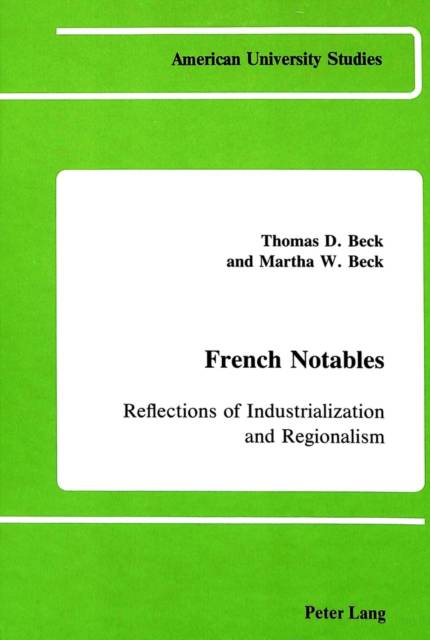
- Afhalen na 1 uur in een winkel met voorraad
- Gratis thuislevering in België vanaf € 30
- Ruim aanbod met 7 miljoen producten
- Afhalen na 1 uur in een winkel met voorraad
- Gratis thuislevering in België vanaf € 30
- Ruim aanbod met 7 miljoen producten
Zoeken
Omschrijving
French Notables is the result of the first comprehensive analysis of the electoral rolls and the economic censuses of the censitaire monarchies. The Becks have concluded that although the nobility remained the wealthiest group in society and the landed in general were still dominant, the diversity of the notables and the economy was great. Men such as negociants, meuniers, and cultivateurs were all part of the electorate and their numbers increased with economic growth. The non-landed electors were found everywhere, but concentrations of more than 20,000 people found them in sharply rising percentages. The economy was also highly diversified, with industry especially dominant in cities of more than 40,000 people. The north of France, especially along the coast, was the most advanced region of France, and the electors reflected the industrialization and regionalism of the country.
Specificaties
Betrokkenen
- Auteur(s):
- Uitgeverij:
Inhoud
- Aantal bladzijden:
- 266
- Taal:
- Engels
- Reeks:
- Reeksnummer:
- nr. 24
Eigenschappen
- Productcode (EAN):
- 9780820403939
- Verschijningsdatum:
- 1/10/1987
- Uitvoering:
- Hardcover
- Formaat:
- Genaaid
- Afmetingen:
- 225 mm x 156 mm
- Gewicht:
- 439 g

Alleen bij Standaard Boekhandel
+ 94 punten op je klantenkaart van Standaard Boekhandel
Beoordelingen
We publiceren alleen reviews die voldoen aan de voorwaarden voor reviews. Bekijk onze voorwaarden voor reviews.











